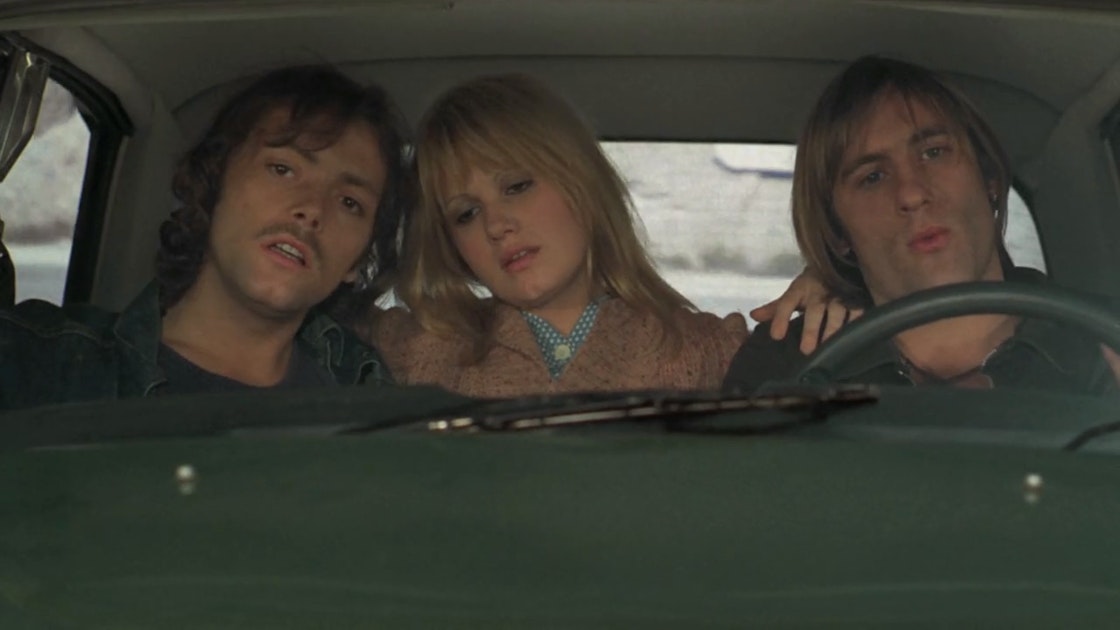A couple of weeks ago, I re-watched Going Places, which in 1974 turned budding French actor, Gerard Depardieu into an international star. Coincidentally, around the time of that viewing, a fresh set of allegations against Depardieu involving sexual violence and harassment came out. I couldn’t help but notice the similarities between his loutish pig of a character, Jean-Claude, and—allegedly—Depardieu’s real-life. It’s far from a flattering picture of a guy who considers Vladimir Putin a buddy.
Another revered member of the film world at that time, critic Pauline Kael, called the movie “an explosively funny celebration and satire of men’s daydreams.” If you’re a man, see if the following scene from Going Places is a celebration of your “daydreams,” even the darkest ones: Two sex predators, Jean-Claude and Pierrot (Patrick Dewaere) are alone on a train with a sexy young mother who’s breastfeeding a baby. They move next to her, intimidate her, and then coerce her into giving Pierrot a feeding, with Jean-Claude participating with his hands. While Pierrot laments that the assault didn’t get him aroused, the young mother did. And when she gets off the train to meet her husband, who director Bertrand Blier presents as a milquetoast, Jean-Claude and Pierrot joke around about how they warmed her up for the dweeb. The message is clear: bored young mothers enjoy rough sexual abuse, which they can only get from street ruffians, not their boring husbands.
The film telegraphs its nihilism right from the opening scene, in which Blier’s leering camera captures the two pals terrorizing a middle-aged woman walking down the street. I hope this wasn’t one of the scenes Kael found “explosively funny,” although Blier does present it as comedy, despite the rape vibe. Pierrot unzips his fly with a wicked chuckle as they pursue the terrified, screaming woman, and Jean-Claude pinches her ass. And, in the end, it’s all for the 15 francs in her purse and a pack of cigarettes, which they discover after having a good laugh while neighborhood men unsuccessfully chase them through a field. The message, once again, is clear. These two guys are just a couple of scamps messing around with the dull conformists of society.
Depardieu’s taken heavy flak at home recently—more than usual—with accusations going back decades leveled at him by 20 women. France’s most revered actor, who made his acting debut in 1965 at the 17, has appeared in more than 200 films, but this month, he was formally charged with two criminal counts for alleged sexual assaults committed in September 2021 during the shooting of the film, The Green Shutters. Accusations of sexual assault and rape by actress Charlotte Arnould are also making their way through the courts.
In April, French newspaper Mediapart revealed that 13 women accused Depardieu of rape and sexual assault on the sets of various films he was shooting between 2004 and 2022. In July, public television channel France 2 aired a documentary, Depardieu: The Fall of an Ogre, which showed footage of the actor making obscene comments to and about women during a visit to an equestrian center in North Korea—e.g. “they’re all sluts”—and even making explicitly sexual comments about a 10-year-old girl.
After the disgusting train scene, the two creeps then break into a home and smell the panties of a young girl—Jacqueline—they estimate, looking at her photo, to be about 16. Then they bathe together. Jean-Claude shampoos his buddy’s legs and hair before fondling his ass, and the tells him how handsome he is, and that he “almost” turns him on. Pierrot replies, without rancor, “Get your hands off, fag,” to which Jean-Claude replies, “How would you know if you haven’t tried it?” But after this brief homoerotic interlude, the pair are back on the road, taking their aggressions out on women again.
If Depardieu were an American actor, he’d be over by now, but despite decades of innuendo, accusations, and now criminal charges, he’s appeared in a dozen films and three mini-series since the first formal charges were filed against him. French cinema heavyweights have continued their support of Depardieu. President Emmanuel Macron has so far fended off calls to strip the actor of his Legion of Honor award, referring to a “witch hunt.” “He makes France proud,” said the president, in December, 2023, the same month that dozens of French luminaries published an open letter in Le Figaro referring to a public lynching of the French actor.
The #MeToo movement hasn’t made the inroads into French society as it has in the US. The condemnation of men for making “unsolicited advances” and giving “unwanted compliments” to women is a scolding approach that’s too puritan for the more sexually sophisticated French. In 2018, French newspaper Le Monde published an open letter signed by 100 prominent women, including actress Catherine Deneuve, defending men’s “freedom to bother,” meaning freedom to hit on women, whether they’ve signaled an openness to an advance or not. In France, women aren’t as delicate as American feminists imagine them to be.
Still, the tide’s shifting against Depardieu in France, where the reverence in which he’s held is straining at holding off the number of allegations. Actress Anouk Grinberg, who’s known the actor for decades, spoke out against him last October. “Everybody who has ever worked with him knows he assaults women,” she said. “Everybody let him be a monster.” The monster played himself in Going Places, but instead of the French viewing him as a rapist, they saw Jean-Claude as an authentic rebel who took from the bourgeoisie everything they held dear.
While watching the film, I remembered reading about a 1978 interview Depardieu did in which he said of his troubled youth, “I had many rapes. Too many to count. But it was absolutely normal in those circumstances.” That admission was met with uproar in the US, but barely a ripple in France, the nation that welcomed Roman Polanski after he drugged and raped a 13-year-old girl. But it’s getting more difficult to shrug off the “ogre’s” past.
Going Places did have some laughs, and the film features a fine score by Stephane Grappelli. But I can’t remember ever seeing a more misogynistic, cynical film. Maybe Blier made it that way intentionally just to provoke, but I wouldn’t watch it again. The film ends with the lads on the lam, once again, taking a car from a man and his wife and teenage daughter, Jacqueline, who decides to run away with them. They find out she’s a virgin, and sniff her crotch to make sure she’s the same 16-year-old whose panties they’d already enjoyed. Nodding in agreement, they proceed to deflower her, after which they drive away, dropping the girl off on the side of the road.









